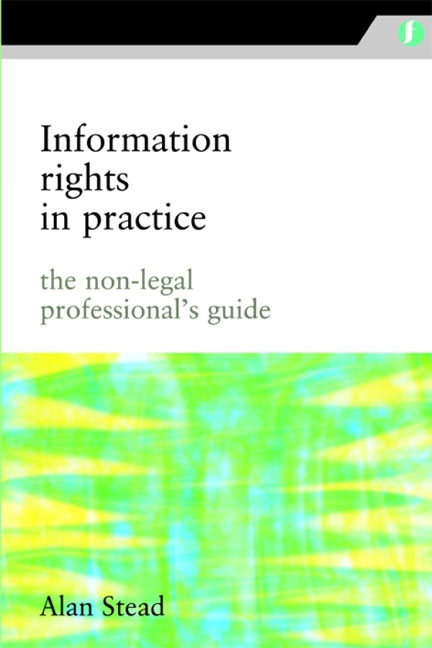Book contents
- Frontmatter
- Contents
- Acknowledgements
- Table of statutes and case law
- Abbreviations
- 1 Introduction
- 2 Data Protection Act 1998
- 3 Definitions of personal data
- 4 The scope of the Data Protection Act
- 5 The data protection principles
- 6 Access to personal data
- 7 Data sharing
- 8 The Freedom of Information Act 2000 and Environmental Information Regulations 2004, SI 2004/3391
- 9 Scope of the Freedom of Information Act 2000 and the Environmental Information Regulations 2004
- 10 Application of exemptions and exceptions
- 11 The public interest test
- 12 Publication schemes
- 13 Compliance, the Information Commissioner and the Information Tribunal
- 14 Disclosure logs
- 15 Records management – Section 46 code of practice
- 16 Other legislation
- 17 Interaction of the legislation
- 18 Summary
- Appendix 1 Data protection principles
- Appendix 2 Flow chart of FOI
- Appendix 3 Exemptions and exceptions under the Freedom of Information Act 2000 and the Environmental Information Regulations 2004
- Appendix 4 Bibliography and useful web addresses
- Appendix 5 Published standards for records management
- Index
10 - Application of exemptions and exceptions
Published online by Cambridge University Press: 09 June 2018
- Frontmatter
- Contents
- Acknowledgements
- Table of statutes and case law
- Abbreviations
- 1 Introduction
- 2 Data Protection Act 1998
- 3 Definitions of personal data
- 4 The scope of the Data Protection Act
- 5 The data protection principles
- 6 Access to personal data
- 7 Data sharing
- 8 The Freedom of Information Act 2000 and Environmental Information Regulations 2004, SI 2004/3391
- 9 Scope of the Freedom of Information Act 2000 and the Environmental Information Regulations 2004
- 10 Application of exemptions and exceptions
- 11 The public interest test
- 12 Publication schemes
- 13 Compliance, the Information Commissioner and the Information Tribunal
- 14 Disclosure logs
- 15 Records management – Section 46 code of practice
- 16 Other legislation
- 17 Interaction of the legislation
- 18 Summary
- Appendix 1 Data protection principles
- Appendix 2 Flow chart of FOI
- Appendix 3 Exemptions and exceptions under the Freedom of Information Act 2000 and the Environmental Information Regulations 2004
- Appendix 4 Bibliography and useful web addresses
- Appendix 5 Published standards for records management
- Index
Summary
Introduction
Regulation 12 of the Environmental Information Regulations 2004 states that:
A public authority shall apply a presumption in favour of disclosure.
(EIR 2004, r. 12)However, there are occasions when some of the data does need to be withheld, and for this purpose the Freedom of Information Act has a list of exemptions in sections 22 to 44 and the Environmental Information Regulations list exemptions under regulation 12. There are a few exemptions elsewhere in the Acts, which will also be listed later in this chapter.
Section 2 of the Freedom of Information Act explains the difference between the two types of exemption that can apply. The first is absolute, indicating that it can be applied without the application of a public interest test. The second is a qualified exemption, to which the public interest test must be applied. This test is explained in Chapter 11. There is a requirement at sections 1(5) and 2(1) to confirm or deny to the requester that information is held, even if the exemption is absolute. The only exception to this is when, by confirming or denying, an answer is given. The example below gives an indication how this might apply.
‘How many nuclear missiles does HMS Umbridge have?’
Confirming that the ship has such missiles but not stating how many (defence exemption) reveals a military secret about the vessel. If it is decided not to confirm, then the requester must be told what exemption would apply if the data were held.
When applying any exemption there is a requirement under section 16 to advise and assist. This means that the exemption has to be explained, and also how the public interest applies. This being the case, the following example would answer the request for the military data shown above.
‘I am unable to confirm or deny that we have the information you requested. To do so could reveal information covered under section 26 of the Freedom of Information Act 2000 in that it could prejudice the defence of the United Kingdom, and the public interest would not be met in releasing such information.’
- Type
- Chapter
- Information
- Information Rights in PracticeThe non-legal professional's guide, pp. 95 - 124Publisher: FacetPrint publication year: 2008



